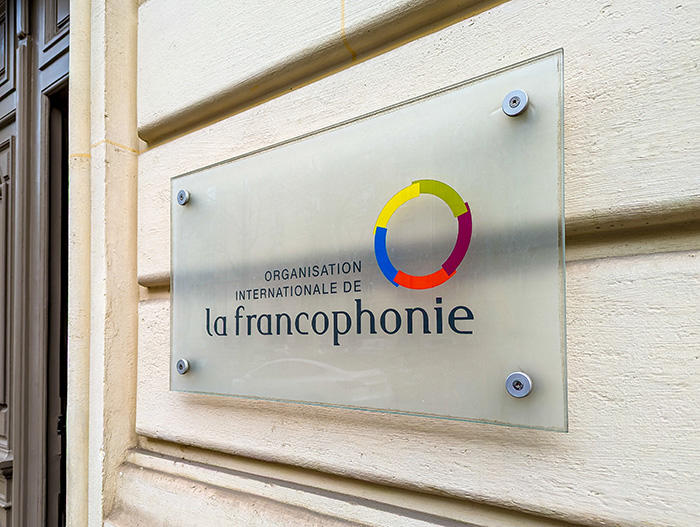Interviews / Africa/s
3 April 2025
The OIF in the Face of Mali, Niger and Burkina Faso’s Withdrawal: A Challenge to the Established International Order?

17–18 March: Mali, Burkina Faso and Niger, three member states of the Alliance of Sahel States, announced their withdrawal from the International Organisation of La Francophonie (OIF). These withdrawals take place against the backdrop of a wider geopolitical context marked by the deterioration of relations between France and Sahel countries, regional realignments, and growing challenges to the established international order and multilateral initiatives, which remain largely shaped by a post-Second World War Western model. How can this departure be explained, and what consequences will it have for the OIF? To what extent does it signal a weakening of ties between France and the Sahel countries? Caroline Roussy, Research Director at IRIS and Head of the Africa/S Programme, provides some insight.
In what context did Mali, Niger and Burkina Faso successively withdraw from the International Organisation of La Francophonie? How can such decisions be explained?
Niger, Burkina Faso and Mali successively announced their withdrawal from the OIF between 17 and 18 March, just days before the anniversary of the organisation, which is celebrated annually on 20 March. One of the primary aims of this timing was to make a splash – even at the cost of overshadowing the organisation’s celebration and that of its member states.
The decision to leave the OIF appears to be primarily driven by sovereigntist considerations. Several months ago, General Tiani’s Niger had already suspended its cooperation with the organisation after being suspended in turn following the July 2023 coup d’état against President Mohamed Bazoum. At the time, the OIF had called for a swift return to constitutional order and the release of Mr Bazoum, who has been held along with his wife in the presidential palace since the coup. The letter from Mali’s Ministry of Foreign Affairs and International Cooperation to the French Ministry of Foreign Affairs – in its capacity as host of the Organisation – also justifies the withdrawal as follows: “[…] since the beginning of the transition, instead of supporting Mali in achieving the legitimate aspirations of its people, the OIF has made a name for itself by selectively applying sanctions and showing contempt for Mali’s sovereignty.” It continues: “Mali cannot remain a member of an organisation whose actions are incompatible with the constitutional principles that guide public action in Mali, namely the sovereignty of the state, the sovereign choices of the people and the defence of their interests.”
Underlying this, the countries accuse the OIF of applying “double standards”. Guinea, under General Mamadi Doumbouya, appears to have been treated differently. Although it was suspended from the organisation following the September 2021 coup, this suspension was lifted on the eve of the 19th OIF Summit held in Paris in October 2024. Although the comparison might seem valid, the justification was that Guinea had adopted a new constitution to be put to a referendum on 21 September 2025. The organisation’s decision to “express its solidarity with this member country” was intended to support that process. While there may be surface-level similarities, the processes initiated by each country to return to constitutional order differ markedly, and the “double standards” argument runs out of steam here. What does seem clear, however, is that the organisation’s decisions are, whether deliberately or not, misunderstood.
Another argument, not publicly aired but raised by certain analysts, is the OIF’s proximity to France. To some, the organisation is a “Trojan horse” of French foreign policy. It is true that France maintains an ambivalent relationship with the institution. Paris hosts its headquarters, France is one of its main financial backers, and as a member it sits on the Permanent Council of La Francophonie (CPF), the Ministerial Conference of La Francophonie (CMF), and participates in the summit of heads of state. However, beyond these institutional frameworks, France has seldom publicly clarified its relationship with the OIF. This silence has bred suspicion: is it indifference or a covert policy of influence? These doubts feed into the lingering legacy of Françafrique. While it is true that France actively supported the Rwandan candidate’s bid against the incumbent Canadian candidate Michaëlle Jean in order to foster closer ties with Paul Kagame’s Rwanda, it should also be noted that the African Union backed Ms Mushikiwabo’s candidacy.
It would be wrong to assume that the OIF’s successive secretaries-general or its executive bodies are beholden to France. Let us not forget that the organisation comprises far more than just France and francophone African countries. However, it is equally undeniable that the OIF suffers from a lack of clear identity regarding its mission.
To what extent might these withdrawals impact the OIF and the vision it promotes?
Despite rather soothing statements from authorised OIF officials expressing regret while reiterating the organisation’s commitment to remaining close to populations, the unease runs deep.
Firstly, it is important to remember that Niger and Mali are historic members of La Francophonie. The Agency for Cultural and Technical Cooperation (ACCT) – the OIF’s precursor – was established in Niamey in 1970, in a Niger then led by Hamani Diori (one of the founding fathers of the project alongside Léopold Sédar Senghor, Habib Bourguiba and Prince Norodom Sihanouk). One of the key texts underpinning the political structure of the institutional Francophonie, the Bamako Declaration, was adopted in 2000 in the Malian capital.
Secondly, the concerns raised by these three countries fall within a broader global context of challenges to the international order, particularly with regard to unequal treatment. Why, for instance, does the organisation not deliberate on cases of electoral manipulation and/or constitutional tampering? Why should military regimes be considered more culpable or less representative of popular sovereignty than others that wear a democratic veil that is already more than worn thin? Without attempting an exhaustive list, one might point to the constitutional coups in Côte d’Ivoire (2020) and, more recently, Togo, or the decades-long rule of Paul Biya in Cameroon or Denis Sassou-Nguesso in Congo. The OIF will undoubtedly face these thorny questions in the coming years. While democracy and respect for the rule of law remain worthy aspirations, how can we ensure that countries truly commit to them beyond mere discourse – and that democracy and the rule of law emerge from endogenous processes, rather than being seen as externally imposed or reflective of Western criteria?
Even if some might downplay the departure of the three countries from the Alliance of Sahel States (AES) – especially given that they had already withdrawn from the Economic Community of West African States (ECOWAS) in January – they nevertheless raise fundamental issues the OIF can no longer ignore. The credibility and long-term viability of its political mission are at stake.
What do these withdrawals tell us about France’s position in the Sahel? Are other powers benefitting from the deterioration in relations with Paris?
To begin with, I believe it is important to distinguish clearly between France and the International Organisation of La Francophonie, which has its own institutions and governing texts – even if, in popular perception, it may still be seen as a “Trojan horse” for French foreign policy.
That said, if we are to assess France’s position in the Sahel per se, there is no denying that relations with various countries have seriously deteriorated. France was forced – to a chorus of jeers – to withdraw from Mali in 2022, and the reconfiguration of its military presence after Operation Barkhane proved a failure, with the putschists expelling French forces in 2023 after deposing President Mohamed Bazoum. In 2024, Senegal and Chad requested the withdrawal of French bases from their territory, highlighting not only a further decline in relations but also the growing need to normalise these relationships in the long term.
Far from being isolated, the AES countries have moved closer to Russia and China. Elements of the Wagner private military company (PMC), now operating as Africa Corps under the oversight of the GRU (Russia’s military intelligence service), help protect the ruling military leaders. In Mali, some of these forces are more directly involved in operations alongside national defence and security forces. China, for its part, is also active, and may be investing – according to various sources – in critical mineral extraction, arms sales, and diplomatic mediation between AES countries and their West African neighbours, with whom relations have been strained since their departure from ECOWAS.
While withdrawals and returns may be part of the natural cycle of regional and international organisations, the decisions taken by the AES countries mark a significant geopolitical realignment, both regionally and globally. The questions raised for the OIF by their withdrawal are legitimate, and answers must be provided regardless of how one might judge the nature of their regimes.

